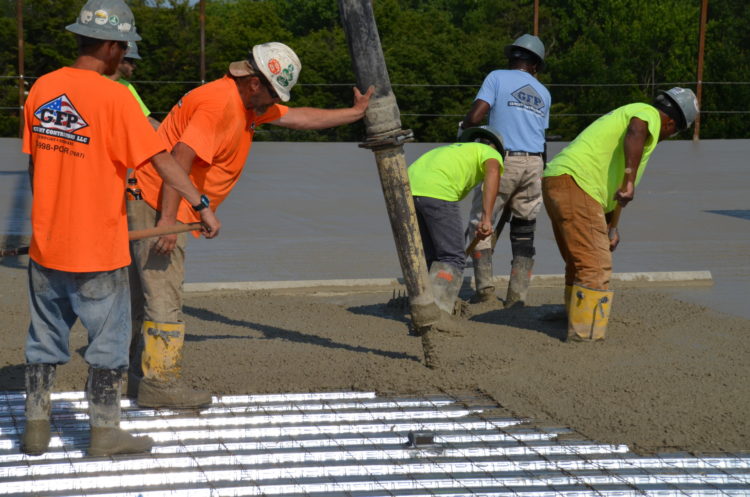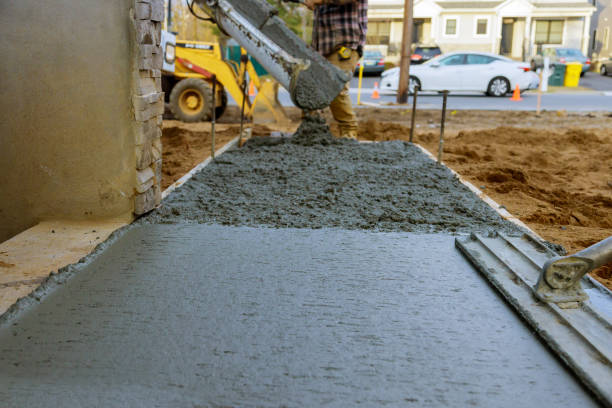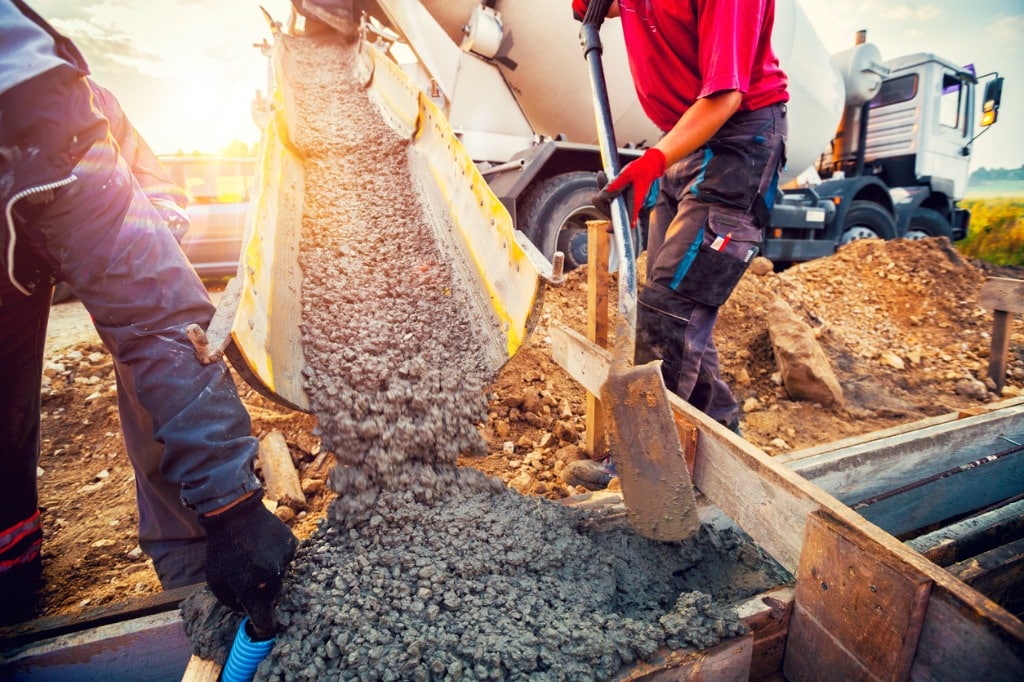
Understanding the Vital Function of a Concrete Professional in Modern Building and Style
Concrete specialists are vital to the building and layout industries. Their competence assurances that structures are not only resilient yet additionally aesthetically pleasing. They involve in numerous obligations, from job intending to quality control, and team up with engineers and engineers. With evolving patterns and innovations, their duty is extra crucial than ever. Comprehending their effect can reveal understandings into modern building practices and the future of building style.
The Significance of Concrete in Construction
Although various materials are used in construction, concrete stays a keystone of modern building techniques due to its strength, toughness, and versatility. This composite material, made from concrete, water, and aggregates, can endure substantial stress and anxiety and is resistant to fire, weather condition, and pests, making it ideal for diverse applications. Concrete's adaptability permits it to be formed into numerous sizes and shapes, facilitating ingenious building styles.
Its thermal mass homes contribute to power effectiveness, helping to regulate indoor temperatures. The widespread schedule of resources and the fairly affordable of concrete also enhance its appeal for large projects, from business structures to facilities like roads and bridges. As urbanization proceeds to rise, the need for reputable and sustainable structure materials strengthens concrete's crucial function in building, making it an essential selection for engineers and home builders intending for long life and strength in their projects.
Trick Obligations of a Concrete Professional
Concrete contractors play an important duty in the building and construction procedure, with numerous key duties that ensure job success. Their tasks consist of project planning and style, product option and administration, in addition to keeping high quality control and assurance throughout the project lifecycle. Recognizing these responsibilities is important for valuing the specialist's effect on construction end results.
Task Planning and Layout
When beginning on a building task, effective job preparation and style play an important role in a concrete specialist's duties. The service provider must team up closely with designers, clients, and architects to understand the task's specs and goals. This involves reviewing website problems, assessing design requirements, and figuring out the scope of work. A concrete professional is also responsible for creating timelines and spending plans, guaranteeing that all phases of the project straighten with total goals. In addition, they have to prepare for possible obstacles and devise solutions to preserve job efficiency. By thoroughly designing each element and intending of the concrete work, the professional sets the foundation for successful execution, making sure structural stability and adherence to security standards throughout the building and construction procedure.
Material Option and Monitoring
Reliable material selection and management are vital responsibilities for a concrete service provider, as these choices directly impact the top quality and longevity of the final structure. Concrete service providers must evaluate numerous materials, consisting of aggregates, admixtures, and support kinds, to guarantee they fulfill project specs and ecological problems. They should consider elements such as toughness, resistance, and workability to weathering. Furthermore, taking care of the supply chain is necessary, as timely distribution of products can remarkably affect job timelines. Professionals need to maintain relationships with suppliers to protect top quality sources while also checking stock levels to prevent shortages or extras. Inevitably, this mindful choice and monitoring of products add to the overall success of building tasks and the durability of the frameworks constructed.
Top Quality Control and Assurance
Quality assurance and assurance are paramount in the construction industry, particularly for concrete service providers charged with supplying resilient and trusted structures. Concrete specialists have to apply strenuous quality assurance steps throughout the building process, guaranteeing that all products satisfy specified standards and regulations (TJ Concrete Contractor). This includes monitoring the blending, putting, and treating procedures to prevent problems and improve architectural integrity. Regular examinations are important, allowing professionals to recognize and rectify concerns without delay. In addition, concrete professionals typically team up with engineers and designers to ensure that the final product lines up with style specifications. By adhering to rigid quality control methods, concrete contractors not just secure the longevity of their work yet also support the depend on of clients and stakeholders in the building and construction industry
Kinds Of Projects Handled by Concrete Professionals
Concrete professionals are usually associated with large-scale construction projects, their experience expands to a varied range of applications. These specialists are important to household projects, such as foundations, driveways, and patios, assuring resilience and visual allure. In commercial building, they add to the creation of floors, walkways, and architectural elements that satisfy specific design and security standards.
In addition, concrete service providers are associated with framework jobs, including tunnels, roadways, and bridges, where their abilities ensure architectural stability and durability. They likewise play an essential function in decorative concrete applications, such as stamped concrete and sleek surface areas, which boost the aesthetic facet of different spaces. Furthermore, their services reach fix and maintenance job, addressing concerns like fracturing or disintegration in existing frameworks. This convenience underscores the crucial duty concrete professionals play in both ornamental and practical elements of modern building and design.
Abilities and Credentials Required
Concrete contractors should possess a varied collection of certifications and abilities to efficiently manage the array of projects they undertake. Proficiency in concrete blending, putting, and finishing is necessary, as is a strong understanding of numerous kinds of concrete, consisting of enhanced and ornamental alternatives. Understanding of building and construction methods, plans, and task monitoring principles is important for effective implementation.
Physical endurance and strength are crucial due to the demanding nature of the work. Professionals need to likewise have solid analytic capacities to attend to unanticipated obstacles throughout jobs. Interaction skills are critical for coordinating with customers, engineers, and various other tradespeople.
Furthermore, acquiring pertinent accreditations can enhance a service provider's trustworthiness and expand their occupation chances. Continuous education and learning in brand-new methods and materials maintains professionals competitive in a quickly developing market. These abilities and certifications jointly make it possible for concrete specialists to provide high-grade results efficiently and properly.
The Role of Concrete Specialists in Safety And Security Compliance
Ensuring safety and security compliance is a basic obligation of concrete contractors, as they browse the complexities of building and construction websites. These specialists are charged with adhering to stringent safety and security regulations and requirements, which are crucial for preventing mishaps and guaranteeing check here the well-being of all site employees. TJ Concrete Contractor. Concrete professionals have to apply comprehensive safety strategies that include training workers on correct devices use and security methods
Furthermore, they are in charge of examining materials and work processes to identify prospective risks. By conducting routine safety and security audits and risk evaluations, concrete specialists can proactively resolve problems prior to they escalate. Additionally, they team up with other construction professionals, such as designers and project managers, to integrate precaution into the general job approach. Ultimately, the dedication of concrete contractors to safety compliance not just protects workers however additionally enhances project effectiveness and top quality, enhancing their important duty in modern construction.
Fads and Developments in Concrete Style
Current improvements in concrete style have presented a series of fads and advancements that focus on sustainability and visual appeals. Sustainable concrete services, decorative ending up strategies, and smart concrete innovations are improving the market. These growths not only enhance architectural integrity however additionally add to eco liable construction techniques.
Lasting Concrete Solutions
As the building industry increasingly focuses on sustainability, cutting-edge concrete options are emerging to decrease environmental effect while enhancing performance. One popular pattern is the use of recycled products, such as smashed concrete and commercial by-products, which not just reduces waste but also boosts the concrete's residential properties. Additionally, developments in admixtures, including fly ash and slag, add to minimized carbon discharges during production. An additional considerable technology entails the development of absorptive concrete, which enables water to stream with and lowers overflow, mitigating flooding and groundwater exhaustion. Additionally, the increase of carbon capture modern technologies in concrete manufacturing holds guarantee for more discharges reduction. These lasting concrete options exemplify the market's dedication to ecologically liable construction practices.

Attractive Finishing Techniques
A huge selection of decorative finishing methods have actually emerged in concrete layout, transforming ordinary surface areas right into aesthetically striking aspects. Methods such as stamping, discoloration, and polishing enable a vast array of aesthetic possibilities, dealing with diverse layout preferences. Stamped concrete mimics all-natural products like stone and block, while staining introduces dynamic colors that improve the surface area's charm. Sleek concrete, recognized for its streamlined finish, includes class to both industrial and household rooms. In addition, microtopping and overlay systems offer cutting-edge choices for rejuvenating existing concrete. These strategies not just enhance the aesthetic characteristics but also enhance durability and upkeep. As fads progress, the combination of ornamental finishes remains to play a critical role in modern-day building, marrying capability with creative expression.

Smart Concrete Technologies
While standard concrete continues to be a staple in construction, the development of clever concrete modern technologies is changing the market by incorporating sophisticated features that improve performance and sustainability. These advancements include self-healing concrete, which makes use of embedded microorganisms that trigger upon splitting, and sensor-equipped concrete that keeps an eye on structural health in real-time. In addition, thermochromic and piezoelectric concrete can adjust to environmental adjustments and create power, specifically. The application of green additives and recycled products also adds to reducing the carbon impact of concrete production. As these technologies continue to advance, they promise to boost durability, reduced maintenance prices, and promote greener building techniques, making them vital for future building and construction jobs. The duty of concrete specialists is progressively substantial in utilizing these innovations.
Frequently Asked Concerns
What Elements Influence Concrete Rates in Construction Jobs?
Concrete rates in building and construction projects is influenced by product prices, labor expenses, task size, place, accessibility of sources, and market demand. Seasonal elements and transport prices can also considerably influence the general prices framework.
Exactly How Do Climate Condition Impact Concrete Job?
Weather greatly influence concrete work; extreme temperatures, humidity, and precipitation can impact setting times, treating processes, and overall high quality - Concrete Contractor Near Me. Specialists must adjust their methods and timetables to alleviate these ecological influences for effective job completion
What Is the Regular Timeline for a Concrete Task?
A regular concrete task timeline varies from a few days to a number of weeks. Elements influencing this period include task dimension, complexity, climate condition, and healing times, which jointly determine the total conclusion timetable.
Can Concrete Service Providers Help With Design Consultations?
Concrete specialists can without a doubt assist with layout appointments, giving important insights on product selection, architectural stability, and visual choices, ensuring that tasks satisfy both functional needs and the client's vision for the ended up product.
What Are Common Mistaken Beliefs About Concrete Toughness?
Usual misconceptions regarding concrete sturdiness include the belief that it is unsusceptible damage which all types are just as strong. Actually, factors like mix layout, environmental problems, and upkeep considerably influence concrete's long-term performance.
They additionally play an essential role in attractive concrete applications, such as stamped concrete and polished surfaces, which boost the visual element of numerous spaces. Efficiency in concrete blending, pouring, and ending up is necessary, as is a strong understanding of various types of concrete, including enhanced and decorative choices. One noticeable pattern is the use of recycled materials, such as smashed concrete and commercial byproducts, which not just reduces waste however additionally improves the concrete's homes. While traditional concrete remains a staple in building, the emergence of wise concrete modern technologies is transforming the industry by incorporating advanced functions that boost efficiency and sustainability. These innovations include self-healing concrete, which makes use of embedded bacteria that activate upon fracturing, and sensor-equipped concrete that monitors architectural health and wellness in real-time.